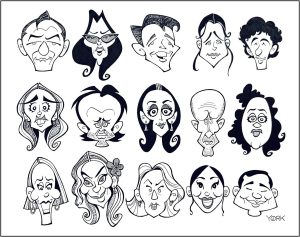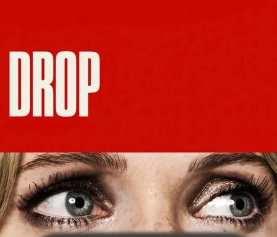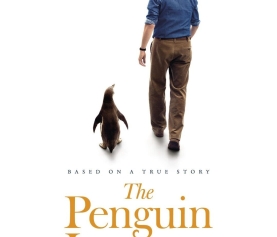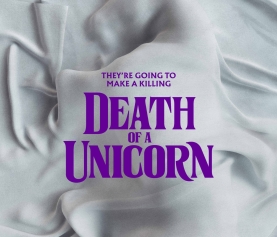
Original caricature by Jeff York of the cast of season three of THE WHITE LOTUS (copyright 2025)
Which head will roll?
That seems to be the hook for so many viewers, let alone critics and journalists, of the darkly comic HBO series THE WHITE LOTUS. Created, written, and directed by Mike White, the guessing game his show has spurred strikes me as leaning rather hard into a trope, an individual one that has gotten too much ink and pontification everywhere from highbrow magazines to talk shows to TikTok. What makes the show so eminently watchable and re-watchable IMHO isn’t the whodunnit or howdunnit, but rather, the intricate study of the characters that populate THE WHITE LOTUS universe. White’s complex and nuanced examination of their struggles to understand who they are and accept such truths are the truest reasons that the show is so compelling season in and season out.
Character is story.
That lesson in screenwriting is evidenced throughout the series and every time I hear someone express how they don’t think enough happens in the show I’m left wondering if they’re paying as close attention to the proceedings as they should. After all, a lot happens, albeit it is often within the characters before it is manifested into action. Most every character of the 10-15 main ones in a season are given strong arcs and within all their delicate shadings are a form of narrative movement. They are often revealed as hidden truths, unexplored depths, or even startling revelations that confound, adjust, and dramatically change lives. They also change our perceptions of them. In many respects, the truest character changes may be within ourselves, the viewers, relating to how we see these people, adjust to them, and ultimately judge them.
Take Victoria Ratliff (Parker Posey), for example, the most quotable character of the third season. (“Piper, nooooo!”) Sure, the rich North Carolina matriarch may marvel like a sixth grader at having flown over the North Pole to arrive at their hotel destination in Thailand, and she may believe one must be Chinese to be a Buddhist, but she’s not quite as vacuous as she so often seems. In episode two, Victoria orders room service over the phone and speaks Thai faultlessly. She also drops bon mots that indicate she’s well aware of the shenanigans of those around here. And why was she so cool towards Kate (Leslie Bibb) when approached by her at breakfast one morning? Is it possible that there might be a complicated past and backstory for Victoria, one that might reveal itself in the season finale? Who knows? But I suspect that she may be shown to be far less the sheltered simpleton as presented. If not, then hats off to White and Posey for keeping us wondering about her no matter what.
White does that sort of thing with all the characters. Hotel worker Mook (Lalisa Manobal) seemed like a sweetheart in the first few episodes but by the penultimate episode, she was practically goading Gaitok (Tayme Thapthimthong) into violence to prove he’s a man. Is that the kind of girlfriend the well-meaning and thoughtful hotel guard was hoping to get in his quest to date her? He was not. Nor were we.
And who’d have thought that Chelsea (Aimee Lou Wood, in the show’s breakout performance), the poor British bird too naïve and inexperienced to understand how wine tasting works at dinner, would be the one to turn around and so perfectly assess the cad that is Saxton Ratliff (Patrick Schwarzenegger)? She rebuffed his advances by telling him bluntly that he had no soul. That may be the first time a female rejection may have truly stuck in his craw and, in many ways, the character was sent reeling ever since that. Saxton, the swaggering son of wealth and privilege, spent the rest of the series fighting his various inner demons, most notably questions about his masculinity and what his drunken tryst with his brother Lachlan (Sam Nivola) and Chloe (Charlotte Le Bon) meant. Is he bisexual or a latent homosexual? What could such self-realizations lead to? These are the story points of THE WHITE LOTUS that keep us talking, wondering, and thrilled by such dramatic plot developments.
Trying to get a thorough bead on the characters is what makes the show so watchable and worth repeat viewings too. (I watch each episode twice.) That way we can pick up more tells and clues with each revisiting. We pick up on foreshadows and nuances that may have gone undetected earlier. Such complexity is also one of the reasons that the guessing game of who will die is so paramount. With so many layers and bits and pieces to be re-examined, the show truly does become a form of procedural and we are the detectives going over all the evidence in our quest to put all the puzzle pieces together.
Did Jacklyn (Michelle Monaghan) sleep with the concierge Valentin (Arnas Federavicius) to one-up Laurie (Carrie Coon) because she’s so competitive or merely because she had lustful urges? Are the fantasies of Timothy (Jason Isaacs) about murdering his family an effort to spare them a life of shame and poverty or a manifestation of the same cowardice that caused him to take the illegal course of actions to cement his wealth? And did anyone expect to hear the reasons Frank (Sam Rockwell) told his buddy Rick (Walton Goggins) that he chose to stay in Bangkok? Such complexities give the human condition its never-ending fascination and this series its shock and awe.
I also think it’s daring of White to not always give us the answers. Equally shrewd is that he rarely is overly strident in any moralizing. Sure, Rick’s story is a shocker, but even more so was his total lack of preparation in trying to convince Sritala Hollinger (Patravadi Mejudhon) that he’s a film director. The fraternal incest between the Ratliff brothers was jaw-dropping, undoubtedly, even though White foreshadowed it from the first moments they appeared, but it’s not the only issue the young men are contending with during their week’s stay in paradise. Thankfully, White didn’t have them hate each other as fallout; that kind of hysteria is not in White’s playbook.
Then there’s Chloe – she may be a high-priced callgirl or concubine, but she seems to be the most in control of any character, even if it involves shacking up with the disreputable Greg/Gary (Jon Gries). And what will come of Belinda (Natasha Rothwell) and her knowledge of his identity? She seems to think he’s the bad guy, but is he? I wouldn’t be surprised if there are revelations that clarify her suspicions, but I won’t be surprised if White pulls the rug out from everyone there either.
And isn’t it interesting how White let the gay characters associated with Greg who troubled Tanya (Jennifer Coolidge) throughout season two become that story’s out-and-out villains? It shows an even-handedness on the part of White that he was willing to show a minority group, so often marginalized, as baddies without equivocating. Is that not in itself a form of derring-do narratively?
If anything, White saves his truest creative sting for the rich and privileged aspects of his characters. The term “eat the rich” has become popular today because so many in the ruling class are taking a chainsaw to the rest of our finances and livelihoods, and White joins in eviscerating those who yield such unbridled power and arrogance as they act so ruinous. The Ratliffs’ money has turned out to be more of a blindfold than a permission slip for them as it has fostered their obsessive navel-gazing, and White lets them all twist in the wind. The three old female friends vacationing together found that their wealth and privilege have done nothing to help them mature past their catty, high-school gossip-girl selves. And no matter what happens to any of these folks, and death seems to be a strong possibility for any of them, many of these characters are already dying as they’re riddled with self-delusion, pettiness, dark souls, and a belief system that their money somehow immunizes them.
Ultimately, the guests’ intended vacation at a meditative spa and resort was to refresh the mind, body, and spirit, yet that’s not the case in White’s Lotus. Instead, he’s fashioned a week’s stay for most of his characters as a descent into harrowing re-assessment and many are flailing within their struggles for understanding, personal identity, station in life, and even the fragility of their connections to others.
Who will return home better? Who will lose themselves, their loves, their lives? Maybe a tsunami will wash away all of them in one strong wave. Let’s hope not. We’ve invested in these people and I for one hope that their stay at The White Lotus will improve most of them in some way. But it is a dark comedy, after all, and a lot of twisted shit happens in the finales of White’s masterpiece of a series.
And if that isn’t enough plot then I don’t know what is.







